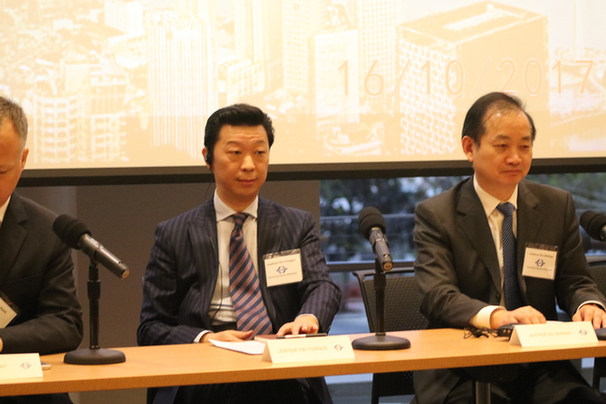Senior judge says China's judicial reform includes mediation
 |
|
From left, Yin Yonglei, chief judge of the civil division No 1 of the Shanghai People's High Court, and Judge Hu Shihao, director of the Judicial Reform Office of the Supreme People's Court of the People's Republic of China, discuss the use of alternative dispute resolution in New York on Monday. Paul Welitzkin/China Daily |
Alternative dispute resolution, which involves mediation and arbitration to resolve disputes instead of litigation, is growing in China, and has the backing of the business and legal communities, according to a senior judge of China's Supreme court.
"Dispute mediation, friendliness is conducive to business success and unity and win-win. This is the concept of mediation solution generally accepted by the Chinese," said Hu Shihao, director of the Judicial Reform Office of China's Supreme People's Court. "Alternative dispute resolution (ADR) can help to deepen judicial reform in China."
Hu told an audience in New York on Monday that resolving disputes through mediation has a history of about 2,000 years in China. He and other legal representatives made their comments at a forum at Fordham University that was sponsored in part by Jams, a private alternative dispute resolution provider and the Chinese Business Lawyers Association.
Hu said that 457 mediation organizations have been set up to cover 90 percent of the provinces in China, and that ADR will also likely be used to settle disputes that emerge from China-led Belt and Road Initiative.
Yin Yonglei, chief judge of the civil division No 1 of the Shanghai People's High Court, the equivalent of the New York State Supreme Court, said his court has used mediation to resolve labor, financial and even marriage disputes. "We have also built a system to resolve marine disputes," he said.
Zhang Wei, director of the Shanghai Commercial Mediation Center, said the Chinese have particularly embraced ADR in the last 20 years. "We are developing a way to safeguard everyone's interests and we work with the courts directly to promote mediation," she said.
In 2016, the Supreme People's Court carried out online mediation trials in six provinces and cities such as Beijing and Shanghai and the Shanghai maritime court, noted Shihao. In August China established its first internet court.
"China's court will combine online dispute resolution (ODR) with modern technology to establish online mediation, online judicial confirmation, online trial, an electronic handling platform to promote the (ADR) mechanism," Hu said.
paulwelitzkin@chinadailyusa.com
















